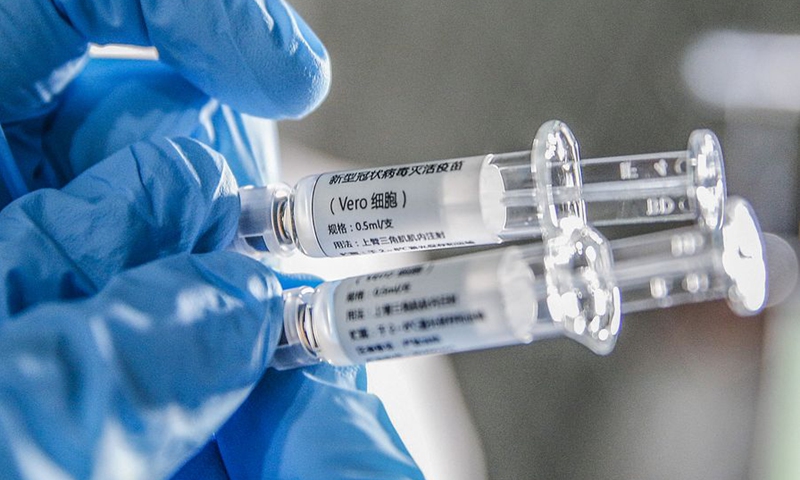SOURCE / INDUSTRIES
First telemedicine platform for Chinese employees overseas put into use

A staff member displays samples of the COVID-19 inactivated vaccine at Sinovac Biotech Ltd., in Beijing, capital of China, March 16, 2020. (Xinhua/Zhang Yuwei)
China's first telemedicine platform for employees of central government-administered enterprises working overseas has been put into operation, aiming to better facilitate the healthcare and medical treatment of Chinese nationals abroad amid the COVID-19 pandemic.
The platform has aided 5,284 Chinese employees working in 37 countries and regions along the Belt and Road routes so far, supported by about 100 medical experts based in China, the Xinhua News Agency reported. It provides health monitoring, virus precaution, remote medical consultation, psychological guidance, and virus prevention and control tutoring services.
The platform was built by the Shenzhen One Health Digital Healthcare Co, which was jointly established by seven Chinese companies including the China Merchants Group and China General Technology, as well as construction pioneers China Railway Group and China Railway Construction Corp.
As some Chinese workers overseas have language barriers and live in countries with scarce medical resources, the platform has offered reassurance by providing professional instruction amid the COVID-19 pandemic, said the head of the platform operator.
"The consulting services provided on the platform are effective as we have invited top-level medical experts in China to provide professional suggestions and instructions on coronavirus prevention and control for Chinese workers abroad. Many of these workers are more relaxed now that they have access to telemedicine," Liu Jian, manager of the Shenzhen One Health Digital Healthcare Co, told the Global Times on Monday.
Liu said that if the platform proves helpful and practical it will be promoted on a large scale, and the company may include more Chinese employees working overseas, including those working for Chinese institutions, banks, insurance firms and media outlets.
However, he noted that the availability of reliable internet is an issue, especially in underdeveloped countries.
Telemedicine is a key part of China's digitalization initiative, and the country has accelerated relevant investment both domestically and internationally, Wang Yiwei, director of the Institute of International Affairs at the Renmin University of China in Beijing, told the Global Times.
To develop their telemedicine industries, underdeveloped countries should improve their electricity and internet infrastructure, Wang said, adding that the State Grid Corporation of China and Chinese telecoms giant Huawei are both able to help.
According to official statistics, about 1 million Chinese employees work abroad, of whom 400,000 work for state-owned companies in more than 180 countries and regions, Xinhua reported.




